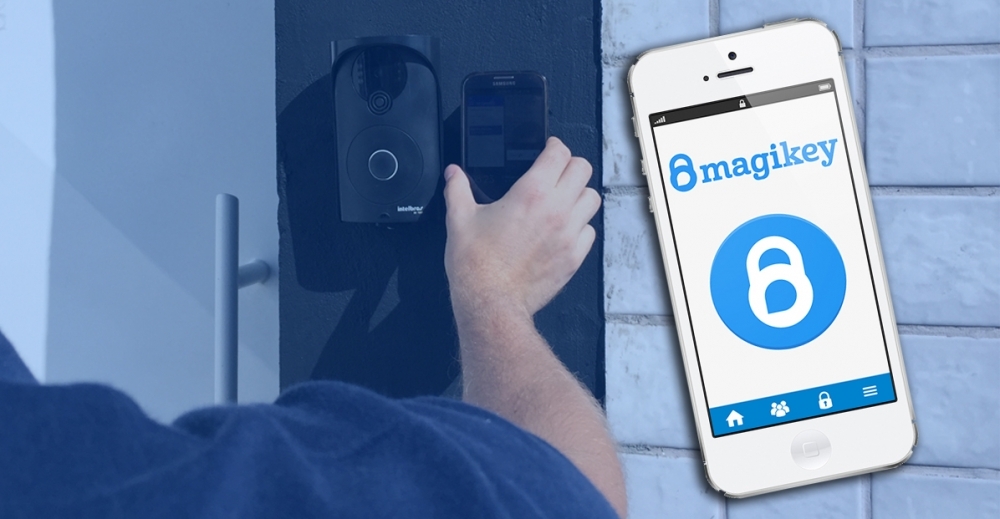

Researchers develop smartphone app that controls access to restricted areas using "virtual keys"
Researchers develop smartphone app that controls access to restricted areas using "virtual keys".
Researchers develop smartphone app that controls access to restricted areas using "virtual keys".

Researchers develop smartphone app that controls access to restricted areas using "virtual keys"
By Diego Freire | Agência FAPESP – A mobile access control system developed by researchers formerly affiliated with the University of Campinas (UNICAMP) in São Paulo State, Brazil, dispenses with physical keys and manual operation by receptionists to manage access to restricted environments. All that is required is an invitation sent via a smartphone app. The smartphone can then be used as a virtual key to open a door, turnstile or gate.
Known commercially as Magikey, the system was developed with support from FAPESP’s Innovative Research in Small Business (PIPE) program as part of the project “Airkey: social access control using mobile devices”.
The user controls access remotely, allowing authorized individuals such as employees to enter restricted areas and remain there at specified times or, in the case of visitors, permitting entry and monitoring their presence.
“Once a visitor has received a message authorizing access via the mobile app, direct communication is established between the visitor and the restricted area, without intermediaries. It’s also possible to control doors according to a schedule and specify who has authorized access and at what times, as needed by the owner. In a manner of speaking, the door knows exactly who passes through it, and more importantly, who’s allowed to,” said Raul Mariano Cardoso, co-founder of Advance Soluções em Informática Ltda., the startup that developed the product.
Compatible with Apple iOS and Android, Magikey lets users control office doors, for example, so that they know in real time who opens them and when. Access keys are distributed to visitors and employees via the app.
The system has three main components: smartphones running the Magikey app, door devices, and cloud software containing a database. Embedded devices are connected to the cloud software, and the user interfaces with the system via smartphone.
Smartphones communicate with the devices that unlock and lock doors by near field communication (NFC), a technology that enables compatible devices to exchange data wirelessly and securely over short distances. As soon as an enabled smartphone running the app approaches a device connected to the system, communication is established automatically via NFC, without requiring additional configuration. Bluetooth can also be used for this purpose.
Push notifications sent from the app to the smartphone also let the user communicate directly with employees or visitors to ask them to wait or to go to a different area, for example.
Internet of Things
According to Cardoso, the ability to create and manage virtual keys is essential to new access technologies based on the Internet of Things (IoT), which enables smart devices (including appliances, vehicles, machines, and other objects with embedded sensors and software) to exchange data via the internet and execute specific tasks. The IoT is expected to consist of 50 billion connected devices by 2020.
“Through this technology, we can make things interact, communicate, and generate data with which users can automate processes and increase systems intelligence. Now, the innovation is coming to the way we unlock doors and access physical spaces. The conventional technology used to do this is over 4,000 years old,” he said, referring to physical keys and locks, which have been much the same since ancient Egypt.
Even the “modern” door lock-and-key system was patented in 1841 and has been on the market for over 150 years. Other access technologies have since emerged, including remote control of gates by radio in 1970 and barcodes. Virtual keys are the next step, according to Cardoso.
“Magikey combines all forms of access in the smartphone, sharing virtual keys via a social app,” he said. “The aim is to make access as simple and natural as possible.”
Visitors who do not have the app installed receive a message asking them to register, so no receptionist is necessary. Users can access an internet page displaying a dashboard with the real-time data for their system.
A prototype of Magikey has been installed in four companies in Campinas. The developers plan to launch the product commercially in July. A new version with enhanced monitoring is in the pipeline.
A paper describing the results of the research project that gave rise to the product was published in the International Journal of Computer Science and Network Security and can be downloaded from paper.ijcsns.org/07_book/201508/20150802.pdf.
Read more about the mobile access system at www.magikey.com.br.
Republish
The Agency FAPESP licenses news via Creative Commons (CC-BY-NC-ND) so that they can be republished free of charge and in a simple way by other digital or printed vehicles. Agência FAPESP must be credited as the source of the content being republished and the name of the reporter (if any) must be attributed. Using the HMTL button below allows compliance with these rules, detailed in Digital Republishing Policy FAPESP.





